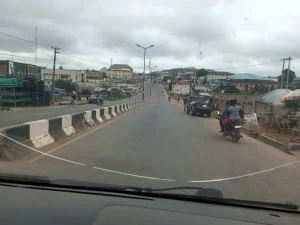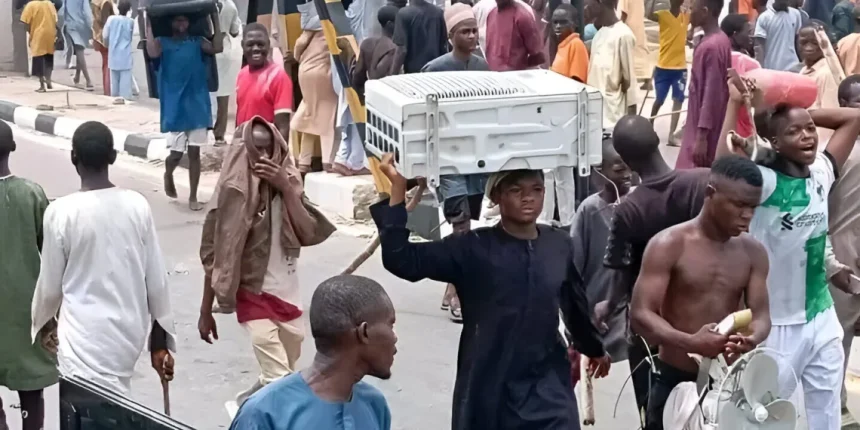The #EndBadGovernance protests organised across Nigeria have turned violent in major cities such as Kano, Gombe, and Abuja.
In some cases, the violence was caused by the actions of security officials while in others, the violence occurred due to the actions of some overzealous protesters or counter-protesters.
The protest started peacefully in all aforementioned states as well as others monitored by PREMIUM TIMES.
Thousands of Nigerians began a 10-day nationwide protest on Thursday to express their frustration over lingering economic hardship.
President Bola Tinubu has said he recognises the right to peaceful protests. Still, his administration is wary of the “dangers” associated with demonstrations that are “vulnerable” to being hijacked by criminals.
The president, as well as other relevant officials of his cabinet, have urged the youth to shelve the protest, saying the protests are unwarranted and politically motivated.
On Thursday, the protest organisers in Abuja and other parts of the country called for the reversal of the fuel price hike, the restoration of affordable electricity tariffs, and the reduction of import duties to their previous rates.
As displayed in some of the placards carried by the demonstrators, the protesters also called for the reversal of many institutions’ hikes in tertiary education fees, the security of farmlands for farmers, and a reduction in the prices of staple foods, among other things.
They are also demanding full transparency and accountability in governance, including the public disclosure and reduction of public officials’ salaries and allowances and an emergency fund to support SMEs.
In Abuja, protesters moving towards the three Arms Zones were tear-gassed in a bid to disperse them and prevent them from accessing the area.
The zone is where the National Assembly, the Supreme Court, and the Aso Villa are located.
Armoured Personnel Carriers conveying soldiers and police operatives were deployed to prevent the protesters from entering the Three-Arms Zone.
Earlier, Abuja protesters at the entrance of the MKO Abiola stadium were told by the police to go inside the stadium. They refused and instead commenced a march towards Eagle Square, close to the Three Arms Zone.
PREMIUM TIMES reporters on the ground observed that in an attempt to prevent the protesters from accessing the iconic Eagle Square around the Three Arms Zone, the police fired tear gas indiscriminately.
As soon as the protesters approached Eagle Square, chaos ensued. The police stationed at strategic points took up tactical positions around the protesters and fired tear gas at them.
However, instead of dispersing, the protesters are regrouping.
Many protesters have regrouped around the Ministry of Finance, blocking Ahmadu Bello Way and pushing back towards the police. Many people were injured, and police specifically targeted journalists and arrested at least two of them, including a PREMIUM TIMES journalist whose phone was seized after he was beaten despite identifying himself as a journalist.
The police also used tear gas to disperse another set of protesters at the NYSC junction in Kubwa.
In Kano state, the protest turned violent after some protesters took to the streets with dangerous weapons.
At about 10:15 a.m., Kano protesters invaded a popular Rufaidah Yoghurt store in Hadejia Road, Kano, and went on a looting spree.
The protesters also looted a yet to be commissioned industrial park belonging to the Nigeria Communications Commission.
Similarly, the peaceful protests in Gombe took a dramatic turn as clashes erupted, leading to a chaotic scene that required the intervention of security officials.
Local leaders and community organisations have called for calm and dialogue to address the underlying issues that sparked the protest.
Efforts are being made to engage with protest organisers and government officials to find a resolution and prevent further unrest.
No protests in Ekiti as banks, markets open for business
The anticipated #EndBadGovernance protest scheduled to take off nationwide on 1 August failed to take place on Thursday in Ekiti, as no protester was seen at the Fajuyi park, the usual venue for such events.
Most roads were also devoid of activity or any form of protest.

Recall that the Ekiti State Governor, Biodun Oyebanji had, on Wednesday, vowed to ensure protection of lives and property of citizens of the state in the wake of the planned protests.
Mr Oyebanji said Nigeria and its people cannot afford “another massive destruction of our economic base” as witnessed during the #EndSARS protest that led to the destruction of many private and government infrastructure.
Addressing the people of Ekiti State in a statewide broadcast on Wednesday morning, the governor expressed concern that the planned protest has the potential to degenerate into violence and reverse his administration’s steady progress to shared prosperity.
In addition, the state government had met with various interest groups including monarchs, student leaders, market women, artisans, drivers’ unions and the security agencies with the goal of nipping the protest in the bud.
It was also learnt that the Local Government chairmen were directed to use all means possible to prevent the protest from taking place in their domains.
However, when PREMIUM TIMES visited the usual convergent point at Fajuyi park in Ado-Ekiti, the state capital, there were no protesters, except armed security forces that cordoned off the area.
At the State Secretariat and some other offices visited, workers stayed away from work as the doors were locked.
But when PREMIUM TIMES visited the bank road, the banks along the corridor were opened for business, while shops around the area were also opened for business.
A visit to some markets in the state capital, including Bisi market and Okeisa market, also showed that people were busy buying and selling.
Meanwhile, Yoruba elders under the auspices of the Yoruba Leaders of Thought lauded the youth for shunning the protest.
The leaders of thought, who declared their opposition when they addressed journalists in Ado Ekiti, urged youths in other states to think of those who depend on daily incomes to survive before embarking on long strikes with processions.

Briefing journalists, the National Leader of the group and ex-permanent secretary, Tajudeen Olusi, said that most of the complaints of the youths, especially hunger, are being addressed by the government.
Mr Olusi, who was represented by the National Secretary, Bayo Aina, said that the government has opened its door for people to bring food without paying any tariff, in addition to the free distribution of foods as palliatives.
“We have total aversion for a strike that will last 10 days. It is abnormal. We are not opposed to a protest, but a protest that will last long will degenerate to an unanticipated and undesirable outcome, and we don’t want it. We urge people to go about their lawful duties without fear of molestation,” he said.
Premium Times


